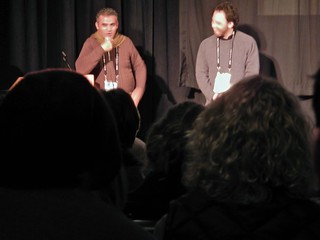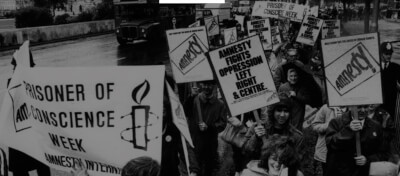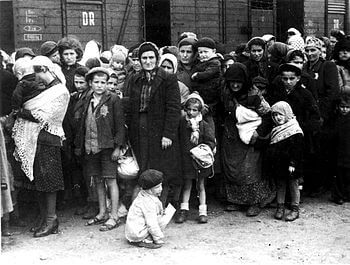Columbia College reinstates Palestinian professor’s censored class
By Ray Hanania

Columbia College reinstated a class that had been stripped from Palestinian American Professor Iymen Chehade following weeks of protests from education professionals and activists and within days of receiving a letter of protest from the Israeli director of the film which provoked an anonymous student to assert the class was biased.
Columbia College had revoked one of two classes that Chehade had been teaching when a student, who has never been identified, alleged that Chehade’s class was biased because it included a showing last November of the Israeli-Palestinian film “5 Broken Cameras” which documents the struggles of a Palestinian in the Israeli Occupied West Bank who was trying to videotape protests against the construction of the Israeli Occupation Wall.
In a letter to Columbia College last week, Guy Davidi, the Israeli co-director of the 2012 Academy Award-nominated film, said he was “surprised and disappointed” by the “wrongful decision” to cancel Chehade’s class because of the showing of his film. “5 Broken Cameras” was co-directed by Palestinian Emad Burnat.
In his letter, Davidi noted his documentary was screened in “dozens of Israeli schools.” He also stated his hope that “the American educational system can hold itself to a higher standard and set an example in its ability to face challenging ideas, whether or not they are in accordance with the mainstream.”
Unfortunately, that goal may not be immediately achieved, Chehade and others acknowledged.
Chehade said Monday that Columbia College reinstated the class but did not acknowledge its historic anti-Palestinian bias. The incident with Chehade is not the first time Columbia College has been accused of having an anti-Palestinian and anti-Arab bias. The College has declined to respond to request to address that bias and past incidents that have occurred, including the firing of a Palestinian American broadcast journalist who was also accused of bias by another student who also made an anonymous complaint.

In November, a student complained in an email to the dean and Dr. Steven Corey, department chair of History, Humanities, and Social Sciences (HHSS), that Chehade’s course was “biased” after viewing Davidi’s film 5 Broken Cameras in class. A series of retaliations began as Chehade was summoned to Corey’s office and instructed to teach the course in a more “balanced” manner. A few days later, one section of Chehade’s course was taken off the schedule after it had been made available for student registration.
“A coalition of students, faculty and community members, RAF-PINE, organized a campaign to defend academic freedom with a call-in, a petition that now has over 6,900 signatures from across the world, a public forum on March 20, and multiple articles and interviews in various media,” Chehade’s supporters said in a release.
The release continued, “Although Chehade’s course has been reinstated, the larger struggle of circumventing mainstream American ideologies of Palestine still exists.”
“A lot of students not only do not know about the occupation, do not know about the systematic suffering of the Palestinian people, they also think that the Palestinians are the ones that are the actual aggressors,” Chehade said. “It is a challenge not only to teach this course, but to get rid of the things that are coming in from the outside, as far as the historic presentation of this issue in the United States.”
Chehade attests that his students not only gain valuable critical thinking skills in his course, but also are thankful to have been offered the reality of occupation and dispossession of the Palestinian people. “I tell my students, I say, ‘This is one of the only places in the country where you can have an honest discussion about the Israeli/Palestinian conflict,’ and the students know that, they understand that, and they appreciate that as well.”
Another key aspect of the effort was a letter sent in Chehade’s defense from the Illinois Chapter — American Association of University Professors (AAUP) to Louise Love, Columbia’s Provost.
The AAUP statement, dated March 25, 2014, applauded what appeared to be the Provost’s efforts to deny bias, but re-asserted that Professor Chehade’s academic freedom was violated. The AAUP statement demands:
“In your March 19, 2014 e-mail you supported the continued use of the 5 Broken Cameras and described Professor Chehade’s course as ‘thought provoking and exciting.’ Yet we believe your laudable support of Professor Chehade’s academic freedom did not reflect prior actions dating back to October 2013. We take you at your word that this is presently your position on this unfortunate matter and, therefore, ask you to consider implementing the following two recommendations.”
The AAUP made two demands:
“First: Columbia College should offer, if sustained by adequate enrollment, Instructor Chehade two sections of the Israeli/Palestinian Conflict in fall semester 2014. Student interest has been robust and given the public scrutiny surrounding this case will likely increase looking forward.
“Second: We urge that the policy of handling student complaints undergo a strategic reassessment. The current system as revealed in this case is clearly broken and conducive to academic freedom violations. The lack of transparency in which a professor cannot challenge his accuser, much less know the identity is an affront to due process and a shocking display of arbitrary treatment of a faculty member. We made suggestions to improve the process including an initial conference between a student complainant and the instructor.”
Iymen Chehade is a part-time faculty member at Columbia College in Chicago. He has earned an M.A. in History and Education and a B.A. in history from the University of Illinois at Chicago. He has taught in the Department of Humanities, History and Social Science since 2007. He initially taught Middle Eastern History: From Muhammad to 1800 through spring semester 2011. Professor Chehade also teaches a course title The Israeli/Palestine Conflict. He has taught nine sections of this course since Fall 2010 and is currently teaching one section of the class in spring semester 2014.
Click here to view story and listen to the podcast interview with Professor Iymen Chehade.
Click here to view the story and listen to the podcast interview with Professor Peter Kirstein.
Although the 95-minute documentary did not win an Oscar, it was celebrated for its forthright expression on the conflict between Palestinians and Israelis. The 2012 film chronicles the non-violent Palestinian resistance against the Israeli construction of the Wall in the village of Bil’in in the Israeli Occupied West Bank of Palestine that has been under Israel’s control since Israel invaded the Jordanian controlled Palestinian area in June 1967. Even more ironic is that many Palestinians had criticized the film because Burnat and Davidi had worked together to make the documentary.
The Arab Daily News submitted a list of questions from Columbia College but never received a response. Columbia College did issue this statement last month in response to the controversy from Louise Love, Ph.D., VP of Academic Affairs and Interim Provost, Columbia College Chicago:
“Columbia College Chicago would like to publicly acknowledge its support of Instructor Iymen Chehade in his use of the widely acclaimed documentary, Five Broken Cameras, to educate students in his Israeli/Palestinian Conflict course. The College would also like to note that Mr. Chehade is in fact currently teaching his course, and has taught it since he joined our faculty in fall 2010.
“Mr. Chehade has received strong and continuous support from Dr. Steven Corey, Chair of the Department of Humanities, History, and Social Sciences (HHSS), and Dr. Deborah Holdstein, Dean of the School of Liberal Arts and Sciences (LAS), in using this important film. Indeed, HHSS and other departments in LAS co-sponsored an on-campus screening of Five Broken Cameras last year, which featured Mr. Chehade moderating a discussion afterward, along with Jewish Voice for Peace, the Cinema Arts + Science Department, and other offices at Columbia College Chicago. HHSS Chair, Dr. Steven H. Corey attended the showing and has never veered in his support for Mr. Chehade’s right to show the movie in a classroom setting. Dr. Corey and the College encourage Mr. Chehade to continue to use the movie (or selections from the documentary) in his teaching and discuss its content, exposing students to such an important perspective on political tensions in the Middle East.
“We at the College believe that an education should, in part, be about preparing students to be active and engaged world citizens and to think critically about political and historical narratives. As such, HHSS offers an array of thought provoking and exciting courses like the Israeli/Palestinian Conflict class and makes every effort to schedule them to meet the curricular needs of a diverse student body.
“Reductions in the number of sections or courses offered at Columbia reflect a multitude of factors such as overall student enrollment, targets for average class size, and rotation of curriculum. Reductions are not made to alter a specific academic field of study or political perspective, and any course on campus may be offered at a reduced frequency from past semesters.
“The College reaffirms the right of all faculty members and students to exercise academic freedom in a manner that Mr. Chehade has enjoyed since he became a member of HHSS.”
Click here to read the story posted by the Columbia Chronicle College student newspaper in which the College “disputes the AAUP findings and denies the class was reinstated in response to the report.”
(Ray Hanania is an award winning former Chicago City Hall political reporter and columnist. He is the managing editor of the Arab Daily News www.TheArabDailyNews.com.
Related articles


- Israelisnipers shooting and killing hospital workers in Gaza - December 11, 2023
- CAIR Condemns Israeli Executions of Wounded, Unarmed Palestinian in West Bank - December 11, 2023
- Arab and Muslim American voters face a “simple choice” between Biden’s inhumanity and Trump’s edgy politics - December 9, 2023























